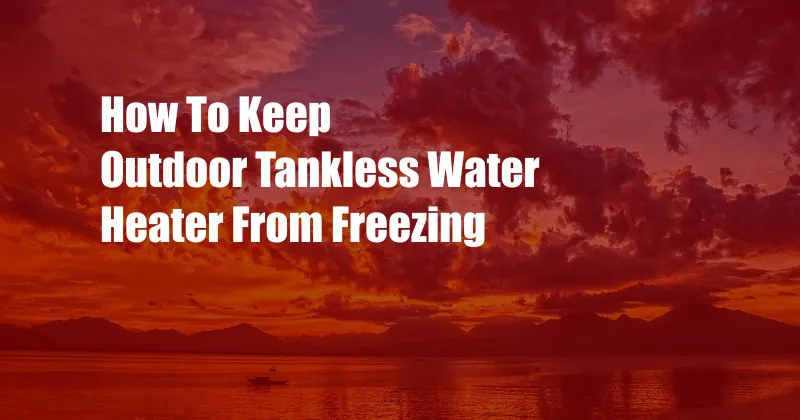
Outdoor Tankless Water Heaters: Defrosting for Winter
Winter’s icy grip can wreak havoc on outdoor appliances, and a frozen tankless water heater is no exception. As a homeowner, I’ve faced this frigid dilemma before, and I’ve gathered valuable insights to keep your water heater running smoothly through the cold months.
The Perils of a Frozen Tankless Water Heater
Tankless water heaters work by quickly heating water as it flows through the unit, eliminating the need for a storage tank. This efficiency comes with a downside: if the water inside freezes, it can expand and damage the system. When temperatures plummet, ensuring your outdoor tankless water heater stays frost-free is crucial for uninterrupted hot water and appliance longevity.
Preventative Measures
To prevent your tankless water heater from freezing, consider the following precautions:
Insulation
Insulating the water heater and exposed pipes will impede heat loss and minimize the risk of freezing. Use foam insulation sleeves or wraps, ensuring a snug fit around all piping.
Drain Valve
Install a drain valve at the lowest point of the water heater. This allows you to drain any residual water from the system when not in use, preventing ice buildup.
Heat Trace Cable
Wrap a heat trace cable around the water heater and pipes. This specialized cable emits heat, preventing freezing and maintaining optimal water temperature.
Defrosting a Frozen Tankless Water Heater
If your water heater has already frozen, take immediate action to defrost it and avoid costly repairs:
Safety First
Before attempting any troubleshooting, turn off the water supply to the heater and disconnect it from the power source.
External Heating
Use a heat gun or hair dryer to apply warm air to the frozen areas of the water heater and pipes. Be cautious not to overheat the components.
Internal Heating
If external heating is ineffective, you may need to open the water heater’s access panel and use a heat gun or hair dryer to warm the internal components.
Maintenance and Tips
Regular maintenance and preventive measures can significantly reduce the likelihood of freezing.
Flush the System
Periodically flush the water heater to remove sediment and debris that can impede water flow. This ensures that water can move freely and prevents freezing.
Shut Off Water
When going on an extended vacation or leaving the property unoccupied during winter, shut off the water supply to the water heater and drain the remaining water.
Power Down
If temperatures are expected to drop significantly, consider disconnecting the water heater from the power source. This prevents the heating element from activating and potentially freezing the water.
Expert Advice
Consult with a licensed plumber for professional advice and assistance in maintaining or repairing your tankless water heater. They can provide tailored recommendations based on your specific system and climate conditions.
Frequently Asked Questions
Q: Can I use a space heater to defrost my tankless water heater?
A: It is not recommended to use a space heater for defrosting, as it can pose fire hazards. Use a heat gun or hair dryer specifically designed for this purpose.
Q: How do I know if my tankless water heater is frozen?
A: If your hot water is intermittent or non-existent, and you hear unusual noises (such as cracking or banging) coming from the unit, your water heater may be frozen.
Q: What is the best way to insulate pipes?
A: Use foam insulation sleeves or wraps, ensuring a snug fit around all exposed pipes. Seal any gaps or cracks with weatherstripping or caulk.
Conclusion
Protecting your outdoor tankless water heater from freezing is essential for uninterrupted hot water and appliance longevity. By implementing these preventative measures and following the defrosting guidelines, you can ensure that your water heater remains in pristine condition throughout the winter season.
Would you like to know more about protecting your outdoor tankless water heater from freezing? Let us know in the comments below!